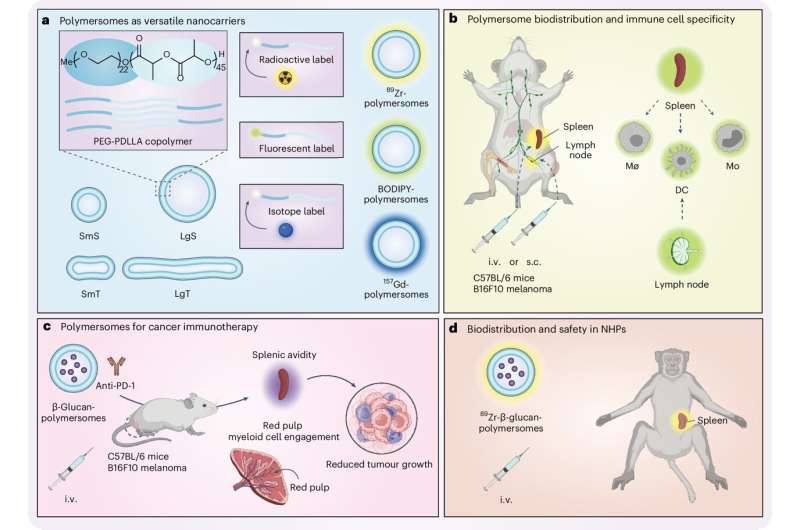This article has been reviewed according to Science X's editorial process and policies. Editors have highlighted the following attributes while ensuring the content's credibility:
fact-checked
peer-reviewed publication
trusted source
proofread
New study shows polymersomes' potential in cancer immunotherapy

Within an international collaboration of 30 scientists, TU/e professors Jan van Hest and Willem Mulder are working on nanotechnological research to accurately stimulate the immune system. The TU/e team is focusing on the behavior of polymersomes that accumulate in the spleen and are taken up by special white blood cells.
The latest generation of cancer drugs uses immunotherapy. A promising strategy is to block signals that inhibit the immune system, thereby eliminating tumor cells. This works quite well, but it can bring unpleasant or even dangerous side effects for the patient when the brakes on the immune system are released too much or for too long.
Therefore, an international collaboration of more than 30 scientists, each with their own expertise, is working on stimulating the immune system in the right place and at the right time. They activated white blood cells of the innate immune system in the spleen, an important organ in our immune system.
Complete understanding of action of particles
The research by TU/e scientists dr. Annelies Wauters and Ph.D. candidate Jari Scheerstra, led by Professors van Hest and Mulder, focused on developing nanoparticles made of biodegradable polymers, called polymersomes. In the lab, they have detailed and categorized the behavior of different variants of polymersomes based on their efficacy. The study is published in the journal Nature Nanotechnology.
"This is a textbook example of how nanomedicine should be conducted, with a complete understanding of the mechanism of action of particles in an in vivo situation," states Mulder, Professor of Precision Medicine at both Radboud UMC and TU/e.
It turns out that spherical polymersomes quickly accumulate in the spleen and are taken up there by special white blood cells. Moreover, animal tests have shown that these polymersomes can deliver cancer drugs to these white blood cells in the spleen, upon which the cells become activated and contribute significantly to the elimination of the tumor.
"It is fantastic that with more than 30 authors, spread across the world, we have achieved this result, with each participating group contributing a part of the expertise," says van Hest, Professor of Bio-organic Chemistry at TU/e.
Hope for a new generation of cancer medication
The logical next step in this work is to further develop this new immunotherapy, which targets white blood cells of the innate immune system, into a new treatment method for cancer. This work still needs to begin, but the current results give hope that in 20 years there will be a new generation of cancer medication that is both more effective and safer for the patient.
More information: Annelies C. Wauters et al, Polymersomes with splenic avidity target red pulp myeloid cells for cancer immunotherapy, Nature Nanotechnology (2024). DOI: 10.1038/s41565-024-01727-w




















